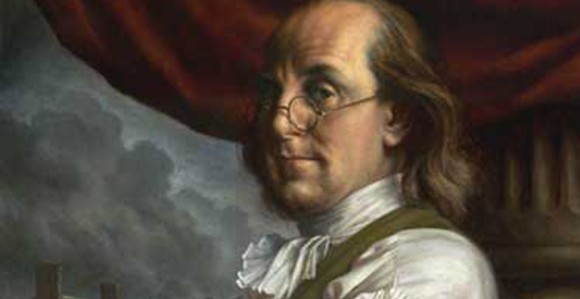Benjamin Franklin (1706-1790) was an American polymath, a classical liberal philosopher and scholar, and a Founding Father of the United States. Franklin was dubbed the “First American” for both exemplifying the emerging nation and for being an early campaigner for its existence and proliferation. As a person, he was seen to extol and practise the values of hard work, education, thrift, tolerance, scientific curiosity and innovation, and strong opposition to any unwarranted or excessive authority. Although he was a slave owner, late in his life he freed all of his slaves and became a leading advocate of abolitionism.
He was one of the earliest advocates of colonial unity (and, of course, independence), and served in many influential posts, being the first US Postmaster General and the first US Minister to France. A supporter of the American War of Independence, he helped to ensure the survival of the colonies by working to ensure that trade continued, especially in the supply of necessary items. This was achieved, in part, due to his skills as a diplomat and associations with important French aristocrats.
Franklin is also a very important figure in the history of science, if only for his theories on electricity. He was also responsible for a plethora of inventions, including the lightning rod, bifocal eyeglasses, and the Franklin stove. He was also successful as an author and journalist. Notable publications include Poor Richard’s Almanack (1732-58) and The Pennsylvania Gazette. Franklin established the University of Pennsylvania, the Library Company of Philadelphia, the American Philosophical Society, and the Union Fire Company. The first three of these remain active to this day.
1) God helps them that help themselves.
Poor Richard’s Almanack (1736)
2) Freedom of speech is a principal pillar of a free government; when this support is taken away, the constitution of a free society is dissolved, and tyranny is erected on its ruins. Republics and limited monarchies derive their strength and vigor from a popular examination into the action of the magistrates.
“On Freedom of Speech and the Press”, Pennsylvania Gazette (17 November 1737)
3) He that falls in love with himself, will have no Rivals.
Poor Richard’s Almanack (1739)
4) Let our Fathers and Grandfathers be valued for their Goodness, ourselves for our own.
Poor Richard’s Almanack (1739)
5) A Mob’s a Monster; Heads enough, but no Brains.
Poor Richard’s Almanack (1747)
6) They who would give up essential Liberty, to purchase a little temporary Safety, deserve neither Liberty nor Safety.
First written for the Pennsylvania Assembly in its Reply to the Governor (11 Nov. 1755)
7) I think the best way of doing good to the poor, is not making them easy in poverty, but leading or driving them out of it. In my youth I travelled much, and I observed in different countries, that the more public provisions were made for the poor, the less they provided for themselves, and of course became poorer. And, on the contrary, the less was done for them, the more they did for themselves, and became richer.
On the Price of Corn and Management of the Poor (29 November 1766)
8) All Wars are Follies, very expensive, and very mischievous ones. When will Mankind be convinced of this, and agree to settle their Differences by Arbitration? Were they to do it, even by the Cast of a Dye, it would be better than by Fighting and destroying each other.
Letter to Mary Hewson (Jan. 27. 1783)
9) There never was a good war or a bad peace.
Letter to Josiah Quincy (11 September 1783)
10) God grant, that not only the Love of Liberty, but a thorough Knowledge of the Rights of Man, may pervade all the Nations of the Earth, so that a Philosopher may set his Foot anywhere on its Surface, and say, “This is my Country.”
Benjamin Franklin, letter to David Hartley (December 4, 1789)

